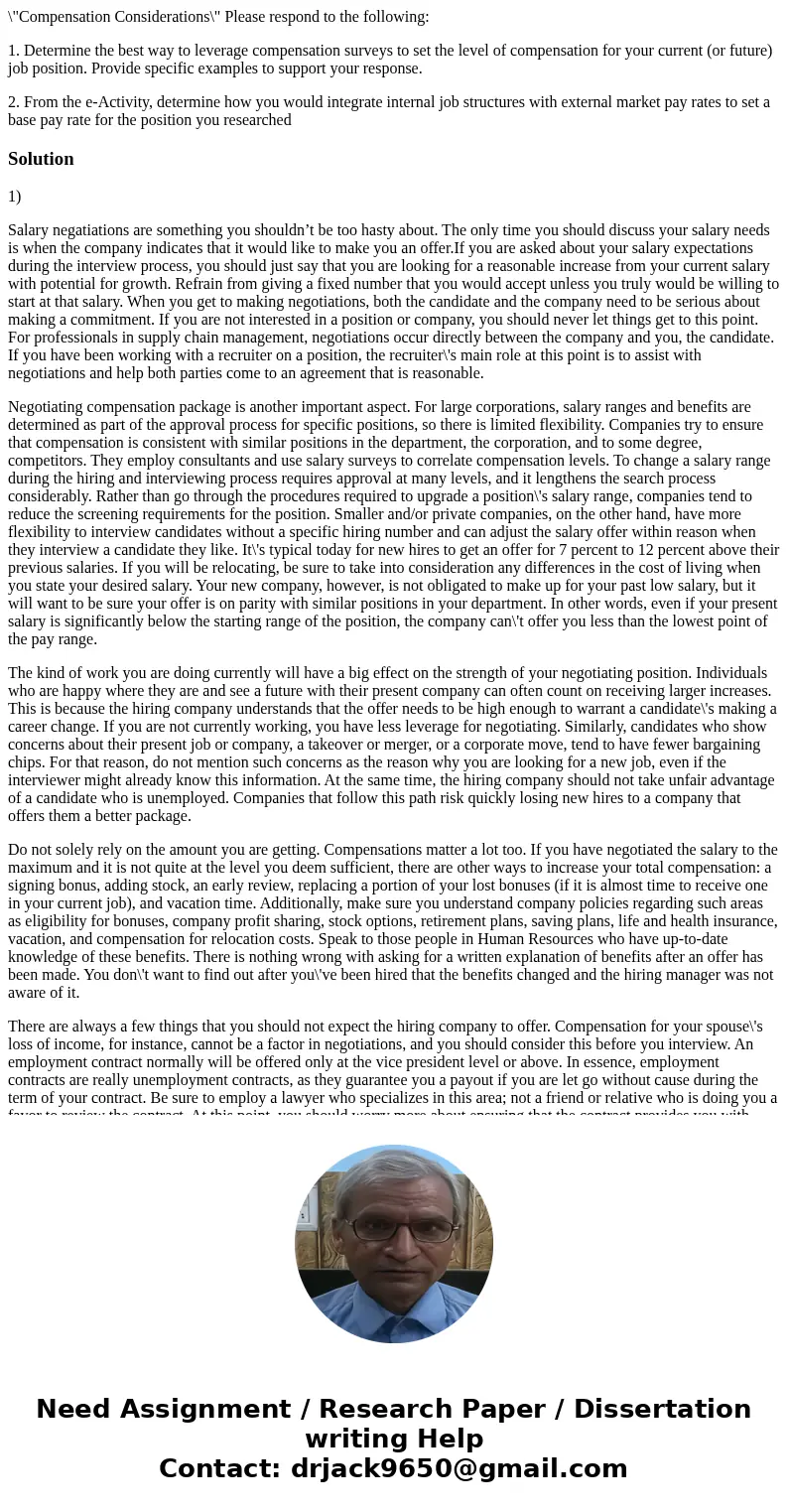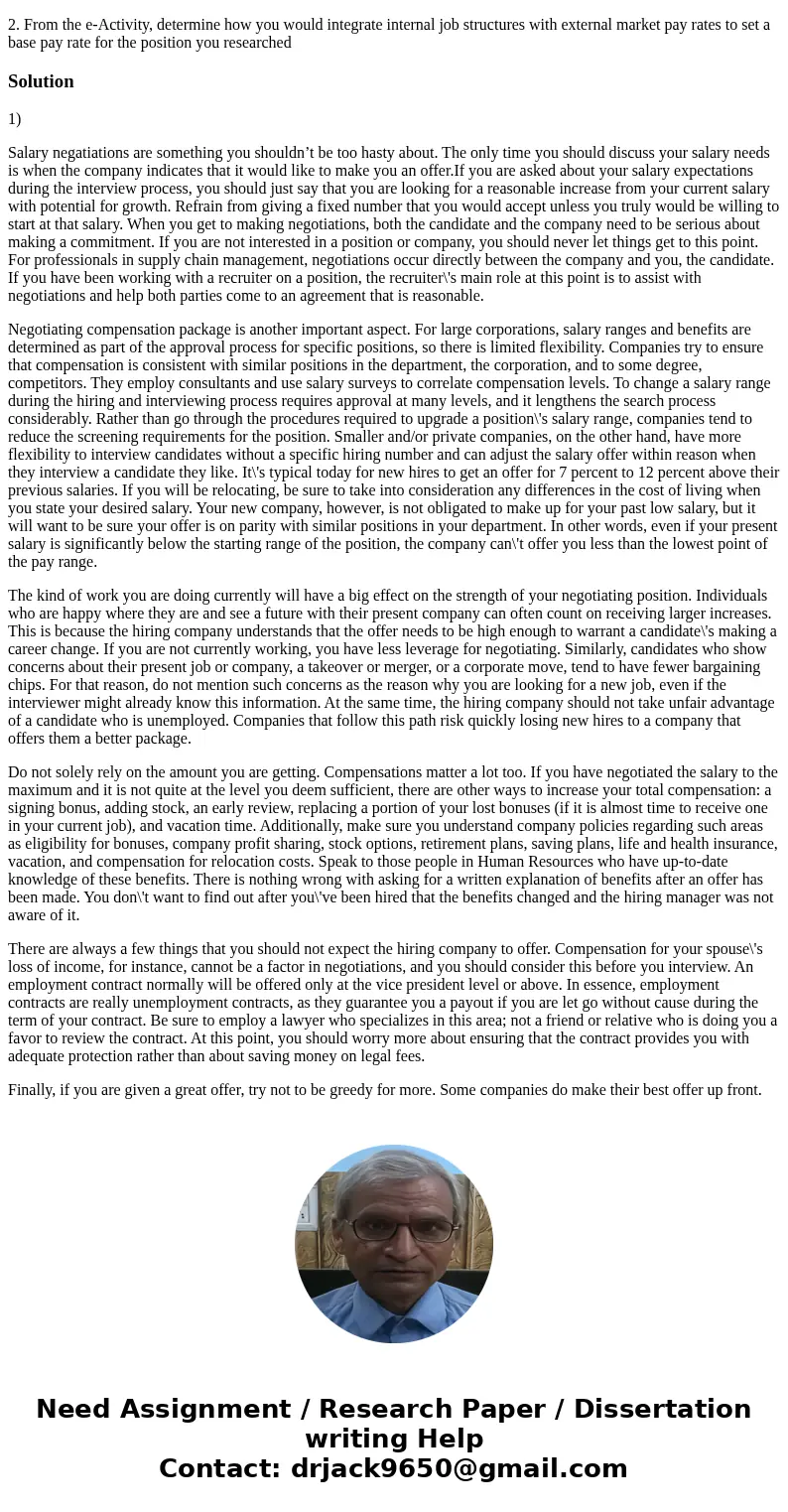Compensation Considerations Please respond to the following
\"Compensation Considerations\" Please respond to the following:
1. Determine the best way to leverage compensation surveys to set the level of compensation for your current (or future) job position. Provide specific examples to support your response.
2. From the e-Activity, determine how you would integrate internal job structures with external market pay rates to set a base pay rate for the position you researched
Solution
1)
Salary negatiations are something you shouldn’t be too hasty about. The only time you should discuss your salary needs is when the company indicates that it would like to make you an offer.If you are asked about your salary expectations during the interview process, you should just say that you are looking for a reasonable increase from your current salary with potential for growth. Refrain from giving a fixed number that you would accept unless you truly would be willing to start at that salary. When you get to making negotiations, both the candidate and the company need to be serious about making a commitment. If you are not interested in a position or company, you should never let things get to this point. For professionals in supply chain management, negotiations occur directly between the company and you, the candidate. If you have been working with a recruiter on a position, the recruiter\'s main role at this point is to assist with negotiations and help both parties come to an agreement that is reasonable.
Negotiating compensation package is another important aspect. For large corporations, salary ranges and benefits are determined as part of the approval process for specific positions, so there is limited flexibility. Companies try to ensure that compensation is consistent with similar positions in the department, the corporation, and to some degree, competitors. They employ consultants and use salary surveys to correlate compensation levels. To change a salary range during the hiring and interviewing process requires approval at many levels, and it lengthens the search process considerably. Rather than go through the procedures required to upgrade a position\'s salary range, companies tend to reduce the screening requirements for the position. Smaller and/or private companies, on the other hand, have more flexibility to interview candidates without a specific hiring number and can adjust the salary offer within reason when they interview a candidate they like. It\'s typical today for new hires to get an offer for 7 percent to 12 percent above their previous salaries. If you will be relocating, be sure to take into consideration any differences in the cost of living when you state your desired salary. Your new company, however, is not obligated to make up for your past low salary, but it will want to be sure your offer is on parity with similar positions in your department. In other words, even if your present salary is significantly below the starting range of the position, the company can\'t offer you less than the lowest point of the pay range.
The kind of work you are doing currently will have a big effect on the strength of your negotiating position. Individuals who are happy where they are and see a future with their present company can often count on receiving larger increases. This is because the hiring company understands that the offer needs to be high enough to warrant a candidate\'s making a career change. If you are not currently working, you have less leverage for negotiating. Similarly, candidates who show concerns about their present job or company, a takeover or merger, or a corporate move, tend to have fewer bargaining chips. For that reason, do not mention such concerns as the reason why you are looking for a new job, even if the interviewer might already know this information. At the same time, the hiring company should not take unfair advantage of a candidate who is unemployed. Companies that follow this path risk quickly losing new hires to a company that offers them a better package.
Do not solely rely on the amount you are getting. Compensations matter a lot too. If you have negotiated the salary to the maximum and it is not quite at the level you deem sufficient, there are other ways to increase your total compensation: a signing bonus, adding stock, an early review, replacing a portion of your lost bonuses (if it is almost time to receive one in your current job), and vacation time. Additionally, make sure you understand company policies regarding such areas as eligibility for bonuses, company profit sharing, stock options, retirement plans, saving plans, life and health insurance, vacation, and compensation for relocation costs. Speak to those people in Human Resources who have up-to-date knowledge of these benefits. There is nothing wrong with asking for a written explanation of benefits after an offer has been made. You don\'t want to find out after you\'ve been hired that the benefits changed and the hiring manager was not aware of it.
There are always a few things that you should not expect the hiring company to offer. Compensation for your spouse\'s loss of income, for instance, cannot be a factor in negotiations, and you should consider this before you interview. An employment contract normally will be offered only at the vice president level or above. In essence, employment contracts are really unemployment contracts, as they guarantee you a payout if you are let go without cause during the term of your contract. Be sure to employ a lawyer who specializes in this area; not a friend or relative who is doing you a favor to review the contract. At this point, you should worry more about ensuring that the contract provides you with adequate protection rather than about saving money on legal fees.
Finally, if you are given a great offer, try not to be greedy for more. Some companies do make their best offer up front.


 Homework Sourse
Homework Sourse